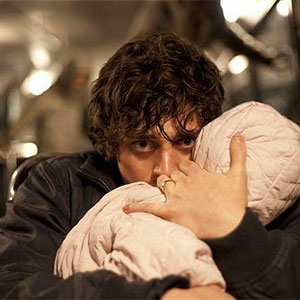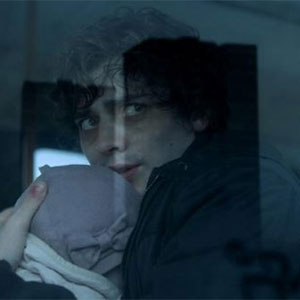Blu Review: Citadel (2012)
 Cast: Aneurin Barnard, James Cosmo, Wunmi Mosaku
Cast: Aneurin Barnard, James Cosmo, Wunmi Mosaku
Director: Ciarán Foy
Country: Ireland | UK
Genre: Drama | Horror | Thriller
Official Trailer: Here
Editor’s Notes: Citadel releases on Blu Ray from New Video Group on January 29th, 2013.
A decaying group of high-rise apartments plagues the skyline like omnipresent doom waiting to explosively uncoil at the slightest provocation. These apartments are unfortunate and unavoidable reminders of the perennially unresolved societal issues of addiction and poverty as the powers that be think that such issues can transplanted en-mass to poorer neighborhoods, creating hopeless and inescapable worlds of poverty with no chances for advancement or escape. Citadel takes polite society’s tendency to relocate its citizens that skew the national curve in embarrassing ways, and extrapolates that tendency to its furthest extreme to create a film that acts as a terrifying parable about the dangers of turning a blind eye and attempting to relocate the problems of society as well as a therapeutic exercise for writer/director Ciaran Foy as his irrational insecurities and phobias take center stage to create a terrifying work of horror firmly rooted in the problems of the real world.
Setting aside our protagonist’s crippling agoraphobia for a moment, the suspicious glances and a general distrust of everyone is nothing new in the emotional composition of a new father.
 Citadel takes the ubiquitous irrational fears of every attentive father and uses them to craft horror that is exasperating as it pushes every hidden button as it materializes the worst nightmares of every new father and sets them in motion with the unpredictable and quickly-shifting audio levels of a Pixies concert. Setting aside our protagonist’s crippling agoraphobia for a moment, the suspicious glances and a general distrust of everyone is nothing new in the emotional composition of a new father. Once you have internalized full responsibility for a new life, everyone seems like an incestuous meth-addicted drywall-mold-rage-virus-fueled maniac at first glance.
Citadel takes the ubiquitous irrational fears of every attentive father and uses them to craft horror that is exasperating as it pushes every hidden button as it materializes the worst nightmares of every new father and sets them in motion with the unpredictable and quickly-shifting audio levels of a Pixies concert. Setting aside our protagonist’s crippling agoraphobia for a moment, the suspicious glances and a general distrust of everyone is nothing new in the emotional composition of a new father. Once you have internalized full responsibility for a new life, everyone seems like an incestuous meth-addicted drywall-mold-rage-virus-fueled maniac at first glance.
These transitory feelings seem inconsequential when compared to Tommy’s (played with pitch-perfect saggy-eyed exhaustion by Aneurin Barnard) impossible living conditions as he must live in constant fear of attack by meth-fueled zombified chavs or government programs that would take his daughter away with equal expedience. Tommy’s agoraphobia seems entirely natural in a world filled with trauma and violence. He tries desperately to overcome his crippling affliction through a (surprisingly and ironically well-attended) support group for agoraphobics, but like many addiction therapy programs and other ineffectual support groups the name of the game is victim blaming as the issues that actually need the most attention are far too difficult to solve.
Community leaders try to keep the decay isolated to a few monolithic structures, but the blight creeps outward in every direction like an unstoppable virus, drying up the commerce in the infected areas and opening new vulnerabilities in a community’s natural immunities as it inevitably and unthinkably encompasses even the richest of neighborhoods.
 Those difficult problems leave us with abandoned monoliths that loom over dull-grey skylines, acting as constant reminders of our societal impotence because real problems such as poverty and addiction are difficult to solve and are therefore re-framed as flaws in the morality of the afflicted. Urban development projects that offer housing and the opportunity for a better life pull up their stakes after they realize that investing in poor neighborhoods offers a dubious proposition in profitability. Community leaders try to keep the decay isolated to a few monolithic structures, but the blight creeps outward in every direction like an unstoppable virus, drying up the commerce in the infected areas and opening new vulnerabilities in a community’s natural immunities as it inevitably and unthinkably encompasses even the richest of neighborhoods.
Those difficult problems leave us with abandoned monoliths that loom over dull-grey skylines, acting as constant reminders of our societal impotence because real problems such as poverty and addiction are difficult to solve and are therefore re-framed as flaws in the morality of the afflicted. Urban development projects that offer housing and the opportunity for a better life pull up their stakes after they realize that investing in poor neighborhoods offers a dubious proposition in profitability. Community leaders try to keep the decay isolated to a few monolithic structures, but the blight creeps outward in every direction like an unstoppable virus, drying up the commerce in the infected areas and opening new vulnerabilities in a community’s natural immunities as it inevitably and unthinkably encompasses even the richest of neighborhoods.
Citadel is a horror film that offers social significance as it simultaneously acts as a personal exploration of the creator’s innermost fears in the proud tradition of horror maestros exorcising their own secret anxieties by confronting them directly. It also follows the lead of genre-defining zombie films by taking topical issues and using them for the genesis of the new face of terror. Whether it be from possible radiation caused by the space exploration of the sixties in Romero’s Night of the Living Dead, or the meth-addicted zombified chavs of Citadel; zombies in any form represent a distillation of the fears of a culture, dehumanized avatars for our unvoiced taboos and secret cultural preoccupations.
-
http://twitter.com/Bryan_C_Murray Bryan Murray




















 Blu Review: Badlands (1973)
Blu Review: Badlands (1973) Review: Room 237 (2012)
Review: Room 237 (2012) SXSW Review: A Teacher (2013)
SXSW Review: A Teacher (2013) Review: The Incredible Burt Wonderstone (2013)
Review: The Incredible Burt Wonderstone (2013) Review: Spring Breakers (2012)
Review: Spring Breakers (2012)



